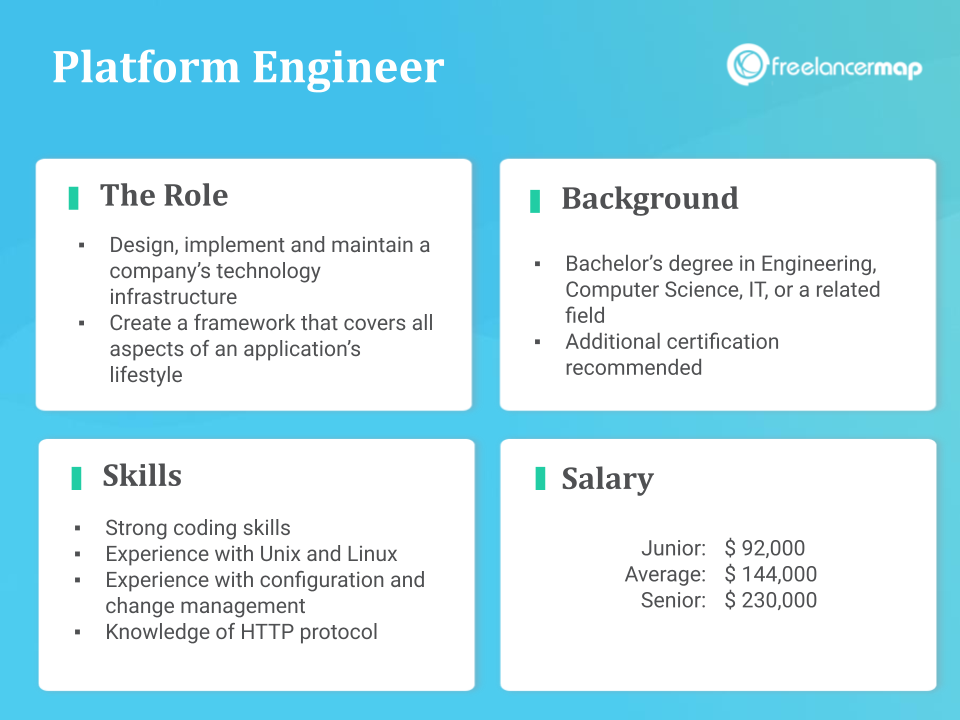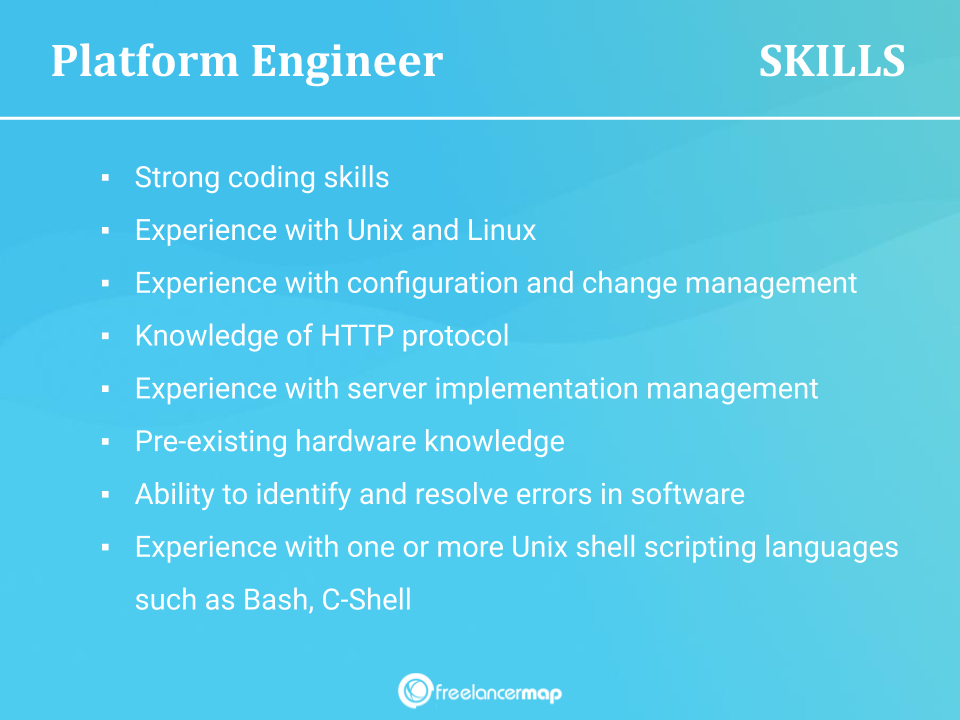Platform engineers use toolchains and workflows to ensure that the platforms they design are as efficient and stable as they can be. They are in charge of maintaining application components and services and improving the developer experience. What does a platform engineer do?
What is platform engineering?
Platform engineering is an emerging engineering approach that organisations use to leverage their cloud platform and accelerate the delivery of applications.
This particular type of engineering makes the developer experience easier and provides engineers with the opportunity to deliver value quickly to production.


Is platform engineering the same as DevOps?
In a sense, platform engineering is a related concept to DevOps with some degree of overlap between the two.
Platform engineering can actually be stated as a DevOps approach that enables developer self-service and allows companies to develop a shared platform. This improves developer experience by providing self-service functionality across the organisation.
📖 Read more: The role of a DevOps Engineer
What is the role of a platform engineer?
A platform engineer is in charge of designing, implementing and maintaining a company’s technology infrastructure.
They create a framework that covers all aspects of an application’s lifestyle and are in charge of performing operations tasks such as monitoring application performance.


Platform engineers are tasked with developing new technologies to support existing applications and identify areas for process and efficiency improvement.
These professionals run diagnostics tests to verify the correct design of hardware and review code written by other engineers to make sure they meet standards for quality and performance.
Responsibilities of a platform engineer:
- Design, implement and maintain a company’s technology infrastructure
- Create a framework that covers all aspects of an application’s lifestyle
- Perform operations tasks such as monitoring application performance
- Develop new technologies to support applications
- Collaborate with other members of the engineering team to design new features
- Identify areas for process and efficiency improvement
- Run diagnostics tests to verify the correct design of the hardware
- Review code to make sure they meet standards for quality
- Analyse all platform-level changes
- Design and maintain all desktop and server deployment activities
Do you need help in platform engineering?
Find a platform engineer for your company here
What are some of the skills needed for a platform engineer?
In order to be a successful platform engineer, you’ll need strong coding skills that can help you develop software when needed. You will also need experience with Unix and Linux as well as configuration and change management.
Platform engineers also need skills in HTTP protocol and experience in the management of server implementations such as Apache HTTPD.


These professionals also need pre-existing hardware knowledge and the ability to identify and resolve errors in software.
Additionally, project management skills may also be a bonus for platform engineers, especially for those who work on large-scale projects.
Skills of a platform engineer:
- Strong coding skills
- Experience with Unix and Linux
- Experience with configuration and change management
- Knowledge of HTTP protocol
- Experience with server implementation management
- Pre-existing hardware knowledge
- Ability to identify and resolve errors in software
- Experience with one or more Unix shell scripting languages such as Bash, C-Shell
- Strong project management skills
- Experience with cloud services
- Strong research skills
- Strong analytical thinking
- Ability to work in a larger team environment when necessary
Join our IT freelancer community today! Create your freelance profile in just 2 minutes.
Background and education
A Bachelor’s degree is ideal in terms of qualifications when it comes to working as a platform engineer. This can be in Engineering, Computer Science, IT, or a related field.
And because engineering jobs often come with specific capabilities that are needed, getting training and obtaining certifications can help you land a good job.
You can find options for training courses that will help you as a platform engineer down below:
- Fundamentals of Unix and Linux System Administration
- Learn Python Programming Masterclass
- Ultimate AWS Certified Cloud Practitioner – 2022
- Learn Oracle Cloud Infrastructure Fundamentals
Looking for a job in platform engineering?
Find the right one for you here
How much do platform engineers make?
Platform engineers can earn an average of $144,000 per year in the USA. Engineers who have just started their careers can expect a salary of around $92,000 whereas those with years of experience and skills can expect a salary of around $230,000 per year.
Salaries may vary depending on experience, the company or the country in which the engineer works.
In Germany, platform engineers can earn anywhere between €57,000-€101,000 whereas in the UK, they can earn between £50,000-£82,000 per year.
Salary of a platform engineer:
| US | $92,000 – $230,000 |
| Germany | €57,000 – €101,000 |
| UK | £50,000 – £82,000 |
Salary of a freelance platform engineer:
| Average Hourly Rate of Platform Engineers | $100/hour |
According to the freelancermap rate index in January 2023, Freelance Platform Engineers make on average $100/hour.
Freelance rates in this field range between $79 and $121 for most freelancers.
If you consider an 8-hour working day, the daily rate would be around $800/day.
